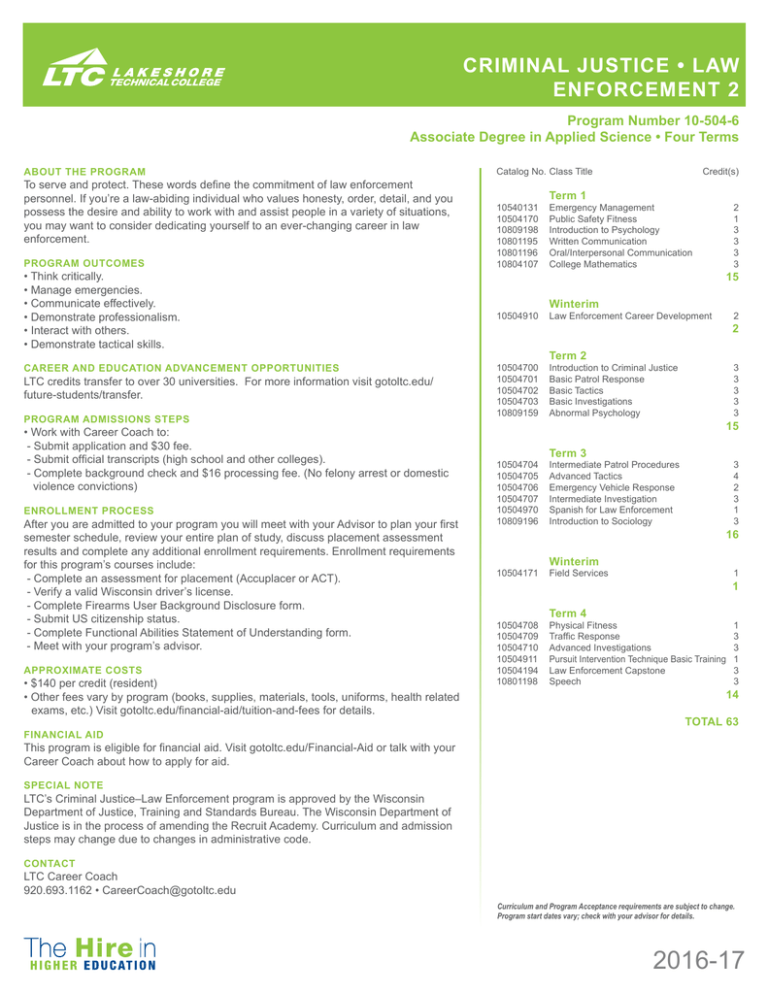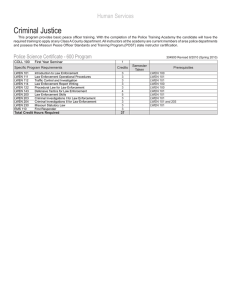To serve and protect. These words define the commitment of... personnel. If you’re a law-abiding individual who values honesty, order,... Term 1
advertisement

CRIMINAL JUSTICE • LAW ENFORCEMENT 2 Program Number 10-504-6 Associate Degree in Applied Science • Four Terms ABOUT THE PROGRAM To serve and protect. These words define the commitment of law enforcement personnel. If you’re a law-abiding individual who values honesty, order, detail, and you possess the desire and ability to work with and assist people in a variety of situations, you may want to consider dedicating yourself to an ever-changing career in law enforcement. PROGRAM OUTCOMES • Think critically. • Manage emergencies. • Communicate effectively. • Demonstrate professionalism. • Interact with others. • Demonstrate tactical skills. Career and Education Advancement Opportunities LTC credits transfer to over 30 universities. For more information visit gotoltc.edu/ future-students/transfer. PROGRAM ADMISSIONS STEPS • Work with Career Coach to: - Submit application and $30 fee. - Submit official transcripts (high school and other colleges). - Complete background check and $16 processing fee. (No felony arrest or domestic violence convictions) enrollment process After you are admitted to your program you will meet with your Advisor to plan your first semester schedule, review your entire plan of study, discuss placement assessment results and complete any additional enrollment requirements. Enrollment requirements for this program’s courses include: - Complete an assessment for placement (Accuplacer or ACT). - Verify a valid Wisconsin driver’s license. - Complete Firearms User Background Disclosure form. - Submit US citizenship status. - Complete Functional Abilities Statement of Understanding form. - Meet with your program’s advisor. Approximate Costs • $140 per credit (resident) • Other fees vary by program (books, supplies, materials, tools, uniforms, health related exams, etc.) Visit gotoltc.edu/financial-aid/tuition-and-fees for details. financial aid Catalog No.Class Title Credit(s) Term 1 10540131 Emergency Management 10504170 Public Safety Fitness 10809198 Introduction to Psychology 10801195 Written Communication 10801196 Oral/Interpersonal Communication 10804107 College Mathematics Winterim 10504910 Law Enforcement Career Development Term 2 10504700 Introduction to Criminal Justice 10504701 Basic Patrol Response 10504702 Basic Tactics 10504703 Basic Investigations 10809159 Abnormal Psychology Term 3 10504704 Intermediate Patrol Procedures 10504705 Advanced Tactics 10504706 Emergency Vehicle Response 10504707 Intermediate Investigation 10504970 Spanish for Law Enforcement 10809196 Introduction to Sociology Winterim 10504171 Field Services 2 1 3 3 3 3 15 2 2 3 3 3 3 3 15 3 4 2 3 1 3 16 1 1 Term 4 10504708 Physical Fitness 1 10504709 Traffic Response 3 10504710 Advanced Investigations 3 10504911 Pursuit Intervention Technique Basic Training 1 10504194 Law Enforcement Capstone 3 10801198 Speech 3 14 TOTAL 63 This program is eligible for financial aid. Visit gotoltc.edu/Financial-Aid or talk with your Career Coach about how to apply for aid. SPECIAL NOTE LTC’s Criminal Justice–Law Enforcement program is approved by the Wisconsin Department of Justice, Training and Standards Bureau. The Wisconsin Department of Justice is in the process of amending the Recruit Academy. Curriculum and admission steps may change due to changes in administrative code. CONTACT LTC Career Coach 920.693.1162 • CareerCoach@gotoltc.edu Curriculum and Program Acceptance requirements are subject to change. Program start dates vary; check with your advisor for details. 2016-17 Abnormal Psychology...surveys the essential features, possible causes, and assessment and treatment of the various systems of abnormal behavior from the viewpoint of the major theoretical perspectives in the field of abnormal psychology. Students will be introduced to the diagnosis system of the Diagnostic and Statistical Manual of Mental Disorders (DSM-IV). In addition, the history of the psychology of abnormality will be traced. Cultural and social perspectives in understanding and responding to abnormal behavior will be explored as well as current topics and issues within abnormal psychology. PREREQUISITE: 10809198 or 10809198OL Psychology-Introduction Advanced Investigations...teaches and applies the skills from the Phase 3 topics outlined in the Wisconsin Department of Justice 720 Academy. Topics include: Moral Reasoning and Professional Responsibility, Fair and Impartial Policing, Victims, Sexual Assault, Child Maltreatment, Interrogations, Physical Evidence Collection, and Testifying in Court. Student learning will occur through lecture, on campus lab activities, and Wisconsin Department of Justice 720 Academy Integration Exercises. COREQUISITE: 10504707 Intermediate Investigation Advanced Tactics...teaches and applies the skills from the Phase 2 topics outlined in the Wisconsin Department of Justice 720 Academy. Topics include: Physical Fitness, Defense and Arrest Tactics (DAAT), and Firearms 2. Student learning will occur through lecture, on campus lab activities, and independent physical exercise. PREREQUISITE: 10504702 Basic Tactics Basic Investigations...teaches and applies the skills from the Phase 1 topics outlined in the Wisconsin Department of Justice 720 Academy. Topics include: Constitutional Law, Crimes, Juvenile Law, Interviews, and Report Writing. Student learning will occur through lecture, on campus lab activities, and the Department of Justice 720 Academy Integration Exercises. CONDITION: 105046 Criminal Justice Law Enforcement 2 program requirements met Basic Patrol Response...addresses the following Department of Justice 720 Academy Phase 1 topics, through classroom lecture, on campus lab, & WI Department of Justice Integration activities: Critical Thinking and Decision Making, Basic Response (RESPOND), RadioProcedures, TraCS, Traffic Law Enforcement, and First Aid/CPR/AED. CONDITION: 105046 Criminal Justice Law Enforcement 2 program requirements met Basic Tactics...teaches and applies the skills from Phase 1 topics outlined in the Wisconsin Department of Justice 720 Academy. Topics include: Fundamentals of Firearms, Vehicle Contacts, Officer Wellness, Physical Fitness and pre-test. Student learning will occur through lecture, on campus lab activities, independent physical fitness activities, and the Department of Justice 720 Academy Integration Exercises. CONDITION: 105046 Criminal Justice Law Enforcement 2 program requirements met College Mathematics…is designed to review and develop fundamental concepts of mathematics pertinent to the areas of: 1) arithmetic and algebra; 2) geometry and trigonometry; and 3) probability and statistics. Special emphasis is placed on problem solving, critical thinking and logical reasoning, making connections, and using calculators. PREREQUISITE: 10834109 Pre-Algebra or equivalent Emergency Management...gives the student a working knowledge of Emergency Management, Public Safety Occupations, and the Incident Command System. Emergency Vehicle Response...teaches and applies the skills from the Phase 2 topics outlined in the WI Department of Justice 720 Academy. Topics include: Emergency Vehicle Operations and Control (EVOC) and Vehicle Contacts 2. Student learning will occur through lecture, on campus lab activities, and WI Department of Justice 720 Academy Integration Exercises. PREREQUISITE: 10504702 Basic Tactics Field Services...teaches a variety of skills needed for handling difficult situations such as ground defense and review of previous Phase 1 and 2 topics. COREQUISITE: 10504705 Advanced Tactics Intermediate Investigation...teaches and applies the skills from the Phase 2 topics outlined in the Wisconsin Department of Justice 720 Academy. Topics include: Constitutional Law 2, Crimes 2, and Domestics. Student learning will occur through lecture and the Wisconsin Department of Justice 720 Academy Integration Exercises. PREREQUISITE: 10504703 Basic Investigations Intermediate Patrol Response...teaches and applies the skills from the Phase 2 topics outlined in the Wisconsin Department of Justice 720 Academy. Topics include: Communication Skills, Incident Command Systems and NIMS, Hazardous Materials and Weapons of Mass Destruction (WMD), Tactical Response, Crisis Management, and TEMS/Self Buddy Aid. Student learning will occur through lecture, on campus lab activities, and Wisconsin Department of Justice 720 Academy Integration Exercises. PREREQUISITE: 10504701 Basic Patrol Response Introduction to Psychology...introduces students to a survey of the multiple aspects of human behavior. It involves a survey of the theoretical foundations of human functioning in such areas as learning, motivation, emotions, personality, deviance and pathology, physiological factors, and social influences. It directs the student to an insightful understanding of the complexities of human relationships in personal, social, and vocational settings. COREQUISITE: 10838105 Intro Reading and Study Skills or equivalent gotoltc.edu | Introduction to Criminal Justice...focuses on the following phase 1 topics as addressed in the Wisconsin Department of Justice Academy 720 curriculum framework: Academy Orientation, Fundamentals of Criminal Justice, Ethics, Cultural Competency, Agency Policy, and Professional Communications. CONDITION: 105046 Criminal Justice Law Enforcement 2 program requirements met Introduction to Sociology...introduces students to the basic concepts of sociology: culture, socialization, social stratification, multi-culturalism, and the five institutions, including family, government, economics, religion, and education. Other topics include demography, deviance, technology, environment, social issues, social change, social organization, and workplace issues. COREQUISITE: 10838105 Intro Reading and Study Skills or equivalent Law Enforcement Capstone...provides practice scenarios for Phase 3 Wisconsin Department of Justice 720 Academy testing. The Phase 3 practical testing will occur in this course. COREQUISITE: 10504709 Traffic Response and 10504710 Advanced Investigation Law Enforcement Career Development…provides an in-depth study of the hiring process commonly used by law enforcement agencies. It also focuses on the skills that are essential to obtain and maintain employment as a police officer and prepares the student for future interviews. In addition, the course provides meaningful information about career options in the Criminal Justice field as well as options within the law enforcement field itself. PREREQUISITES: 10504908 Traffic Theory or 10504114 Traffic Theory and CONDITION: 105041 Criminal Justice-Law Enforcement program requirements met Oral/Interpersonal Communication...provides students with the skills to develop speaking, verbal and nonverbal communication, and listening skills through individual speeches, group activities, and other projects. COREQUISITE: 10838105 Intro Reading and Study Skills or equivalent Physical Fitness...applies the physical fitness skills required by the Wisconsin Department of Justice 720 Academy in this Phase 3 course. Students will apply learning in independent lab activities and an on campus physical fitness test/assessment. COREQUISITE: 10504705 Advanced Tactics Public Safety Fitness...gives the student a basic understanding of fitness for a career in Public Safety occupations. Pursuit Intervention Technique Basic Training…provides the learner with the special knowledge and skills necessary to successfully perform the Pursuit Intervention Technique (PIT) and conduct modified high risk contacts to tactically handle the different vehicle alignments created by the PIT maneuver. COREQUISITE: 10504706 Emergency Vehicle Response or 10504960 Unified Tactical Skills: Emergency Vehicle Operations Simple Spanish for Law Enforcement Officers…prepares the learner to communicate with Spanish speaking individuals during a police contact while maintaining safety. Prepares the learner to perform police duties using limited Spanish such as traffic stops, gaining verbal control when needed, and assess medical emergencies. It includes arrest commands, the ability to recognize danger words commonly used by Spanish speaking attackers, the Spanish translation for the Miranda Warnings and Standardized Field Sobriety Testing. CONDITION: 105046 Criminal Justice Law Enforcement 2 or 105041 Criminal Justice Law Enforcement program requirements met Speech...explores the fundamentals of effective oral presentation to small and large groups. Topic selection, audience analysis, methods of organization, research, structuring evidence and support, delivery techniques, and other essential elements of speaking successfully, including the listening process, form the basis of the course. COREQUISITE: 10838105 Intro Reading and Study Skills or equivalent Traffic Response...teaches and applies the skills from the Phase 3 topics outlined in the Wisconsin Department of Justice 720 Academy. Topics include: Traffic Law Enforcement - Core and Radar, Traffic Crash Investigations and Incident Management, and Operating While Intoxicated (OWI) and Standard Field Sobriety Testing (SFST). Student learning will occur through lecture and on campus lab activities. COREQUISITE: 10504706 Emergency Vehicle Response Written Communication...teaches the writing process, which includes prewriting, drafting, revising, and editing. Through a variety of writing assignments, the student will analyze audience and purpose, research and organize ideas, and format and design documents based on subject matter and content. Keyboarding skills are required for this course. It also develops critical reading and thinking skills through the analysis of a variety of written documents. PREREQUISITE: 10831103 Intro to College Wrtg equivalent and COREQUISITE: 10838105 Intro Rdg & Study Skills or equivalent 1290 North Avenue, Cleveland, WI 53015 | 1.888.GO TO LTC | NCA-Accredited ncahlc.org TTY 711 Lakeshore Technical College does not discriminate on the basis of race, color, national origin, sex, disability or age in employment, admissions or its programs or activities. The Chief Human Resources Officer has been designated to handle inquiries regarding the College’s nondiscrimination policies.

